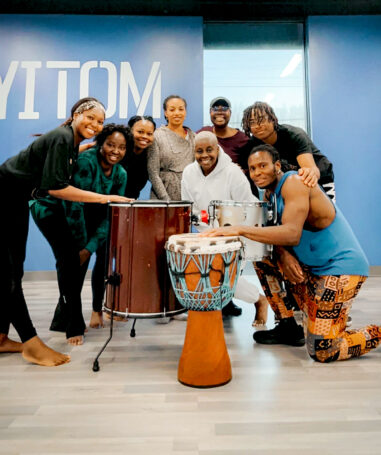March 5, 2024
A 10-week program helps members of the African Caribbean Community De-Stress and Network
With the prevalence of hustle culture, it can become difficult to find time to unwind and de-stress. So, the Alberta Black Therapist Network (ABTN) partnered with Sangea Academy to organize the Getting to Abundance program, a series of dance classes intended to help promote wellness for African Caribbean women in leadership positions.
The program’s development and operation was supported by Edmonton Community Foundation, which provided a $5,900 BIPOC grant. The program started last September and concluded in November.
Bunkola Ojelade, an ABTN therapist who leads the somatic movements section of the session, believes that the program is a vital necessity because of the busy lives that many attendees lead. “Many of these women are mothers. Many of these women are students. Many of these women carry a lot of responsibilities,” she says.
The two-hour sessions typically began with Ojelade leading attendees through somatic movements, exercises that help connect the physical body and the mind. “When you think [about] what your emotions are, and how that affects this turbulence in the body,” says Ojelade. “We experience sensations that are pleasant or unpleasant, depending on how we interpret it.”
After Ojelade led attendees through somatic movements, they did a dance routine led by Reckie Lloyd, the dance instructor and co-founder of Sangea Academy.

“I have to teach the dance movements step- by-step,” says Lloyd, “breaking it down, and then speeding it up as we go and then using those movements as our cardio, so we’ll run it a few times over and over and over.”
Lloyd, a former track-and-field athlete, incorporated training drills and body weight training into African dance. The dancing was accompanied by the African drum, an instrument that, in some cultures, has “healing powers in the rhythms because of their vibration,” says Lloyd. The remaining 30 minutes allowed attendees to connect and network. While the attendees came from different professional fields and sectors, they found commonality and connection in the sessions. For some women, these sessions became a comfortable and safe space away from the hecticness of daily life.
“Because I saw, for many other women, that made such a difference in how they respond to stress and how they respond to the task in their day-to-day, right?” says Ojelade. “[And] having a place, a space to talk about it, and to put it in dance, put it in you know, in centring themselves. So, it kind of helped to ground many of the women, including myself.”
Although Edmonton Community Foundation provided the funding for the 10-week operation period, both Lloyd and Ojelade look forward to potentially running sessions in the future. Lloyd believes that the program could benefit Edmontonians by bringing them together and encouraging them to share their experiences and culture with one another.
Lloyd says, “This is not just a cultural program, but a human experience where everybody has a space to explore, to learn, to better themselves, to know another person and to release some tension.”
“It will make our city a lot better,” he says. “A lot more people will get to know one another.”
This story comes from the Spring 2024 Edition of Legacy in Action. Read the full issue.